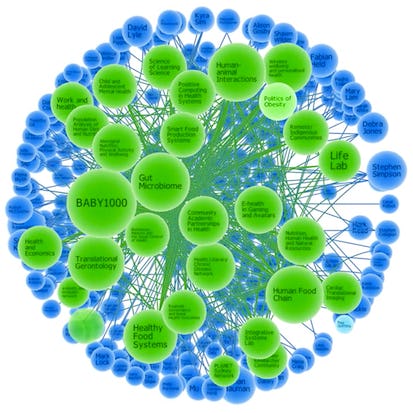- Level Foundation
- Duration 16 hours
- Course by The University of Sydney
-
Offered by

About
This course is multidisciplinary in nature, and aims to equip the global audience of interested lay people, people with chronic disease, public health researchers, health clinicians, students, administrators, and researchers to reflect on the overall impact of the burden of chronic disease . It shows how all chronic diseases (obesity, diabetes, cardiovascular disease, chronic obstructive pulmonary disease, and cancer) are related by a set of common causes, and that such diseases should be tackled, not individually, but as part of a complex system, with interrelated contributing factors. These factors are genetic, environmental, psychological, economic, social, developmental, and media related. The Charles Perkins Centre at the University of Sydney is a unique interdisciplinary education and research hub which seeks solutions to chronic disease through a complex systems approach. Academics in many disciplines (in Science and Medicine, but also in Architecture, Humanities, Law etc) work in a collaborative fashion to produce novel solutions to the problems of chronic disease. All contributors and participants in this course are members of the Charles Perkins Centre and will speak from the unique interdisciplinary perspective that this Centre affords. The course will describe a complex systems approach as the most productive way to ease the burden of chronic disease. It then describes these diseases in detail, their risk factors, and the environmental and biological factors that have led to the current epidemic of obesity, diabetes and cardiovascular disease. Finally, the solutions – and more importantly the process for finding solutions- is the subject of the last module. No one approach by itself can ever be the answer, and certainly not a simple diet and exercise approach. The entire course consists of 5 content modules, plus an extra module for completing assignments and discussions, and takes about 6 weeks to complete. Completion certificates are issued on the basis of participation in all 6 modules. What you'll learn: - How the Charles Perkins Centre recruits interdisciplinary teams to ease the burden of chronic disease - How a complex systems approach is necessary to provide solutions to a complex problem - The fundamentals of chronic disease research and where it is heading - The biggest risk factors for chronic disease and their global incidence - The biological, genetic, social, regulatory, and other influences that have inflated these risk factors - How to provide solutions globally for the reduction of chronic diseaseModules
Introduction to Non-Communicable Diseases and their prevalence
2
Videos
- Module 1 Introduction
- Understanding NCDs
1
Readings
- Module 1 Reading list
A Systems approach
1
Assignment
- Module 1
3
Videos
- How can a multidisciplinary approach solve complex societal problems?
- Solutions
- Module 1 Summary
1
Readings
- Preparation for Assignment 1
Weekly discussion topics
2
Discussions
- Rise in NCDs
- Complex systems
1
Readings
- A note on the weekly discussion topics...
Course presenters and contributors
2
Readings
- The presenters
- Contributors
Cardiovascular and Chronic Pulmonary Diseases
4
Videos
- Module 2 Introduction
- Cardiovascular disease
- Secondary prevention of cardiovascular disease
- Chronic Obstructive Pulmonary Disease
1
Readings
- Module 2 Reading list
Diabetes
2
Videos
- Diabetes Part 1
- Diabetes Part 2
Obesity & Cancer
1
Assignment
- Module 2
3
Videos
- Obesity
- Cancer
- Module 2 Summary
Weekly discussion topics
3
Discussions
- Socio-economic status and non-communicable diseases worldwide
- Diabetes
- Secondary prevention of cardiovascular disease
Physical activity and nutrition
3
Videos
- Module 3 Introduction
- Physical activity
- Diet
1
Readings
- Module 3 Reading list
Tobacco and alcohol
2
Videos
- Tobacco
- Alcohol
Sleep and oral health
1
Assignment
- Module 3
3
Videos
- Sleep apnoea
- Oral health
- Module 3 Summary
Weekly discussion topics
4
Discussions
- Physical activity and nutrition as risk factors for non-communicable diseases.
- The NOURISHING Framework
- Sleep
- Oral health in indigenous communities
Our biology and food supply
3
Videos
- Module 4 Introduction
- Our biology
- Our food supply
1
Readings
- Module 4 Reading list
Corporate interest
2
Videos
- Corporate interest
- Corporate interests and nutrition
Domestic environment and transport
1
Assignment
- Module 4
2
Videos
- Our domestic environment
- Module 4 Summary
Assignment 1
1
Peer Review
- Lifestyle medicine and evolutionary biology
Weekly discussion topics
3
Discussions
- Domestic environment 1 - walking
- Domestic environment 2 - transport
- Corporate interest
What might solve these issues?
3
Videos
- Module 5 Introduction
- A discussion: Solutions
- What is one solution?
1
Readings
- Module 5 Reading list
An approach
2
Videos
- Nutrition systems
- Precision Medicine
1
Readings
- Some cutting edge views
Assignment 2
1
Peer Review
- Confronting chronic disease in the community
Weekly discussion topics
2
Discussions
- Nutrition systems
- Thoughts on solutions to chronic disease
Course conclusion
1
Discussions
- Final thoughts
1
Videos
- MOOC conclusion
Auto Summary
"Easing the Burden of Obesity, Diabetes, and Cardiovascular Disease" is an enlightening course designed for individuals passionate about health and fitness, including laypeople, chronic disease patients, public health researchers, health clinicians, students, administrators, and researchers. Offered by the Charles Perkins Centre at the University of Sydney through Coursera, this course spans approximately six weeks and comprises five comprehensive content modules plus an additional module for assignments and discussions. This foundation-level course delves into the interconnected nature of chronic diseases such as obesity, diabetes, cardiovascular disease, chronic obstructive pulmonary disease, and cancer. It emphasizes a multidisciplinary approach, highlighting the genetic, environmental, psychological, economic, social, developmental, and media factors contributing to these conditions. Learners will explore how these diseases are intricately linked and why they should be addressed through a complex systems approach rather than isolated treatments. Participants will gain insights from the unique interdisciplinary perspective of the Charles Perkins Centre's experts across various fields, including Science, Medicine, Architecture, Humanities, and Law. The course covers the risk factors and global incidence of chronic diseases, the biological and environmental factors driving the current epidemic, and innovative solutions for reducing the global burden of these diseases. Key learning outcomes include understanding the interdisciplinary strategies employed by the Charles Perkins Centre, the necessity of a complex systems approach, and the future direction of chronic disease research. Upon completion, participants receive a certificate, provided they engage in all six modules. Subscription options include Starter and Professional plans, catering to different levels of commitment and professional development needs. This course promises a comprehensive and engaging learning experience for anyone looking to make a significant impact in the field of chronic disease prevention and management.

Stephen Simpson

